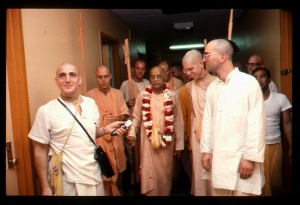SB 10.4.22: Difference between revisions
No edit summary |
(Vanibot #0054 edit - transform synonyms into clickable links, which search similar occurrences) |
||
| Line 23: | Line 23: | ||
<div class="synonyms"> | <div class="synonyms"> | ||
''yāvat'' | ''[//vanipedia.org/wiki/Special:VaniSearch?s=yāvat&tab=syno_o&ds=1 yāvat]'' — as long as; ''[//vanipedia.org/wiki/Special:VaniSearch?s=hataḥ&tab=syno_o&ds=1 hataḥ] [//vanipedia.org/wiki/Special:VaniSearch?s=asmi&tab=syno_o&ds=1 asmi]'' — I am now being killed (by others); ''[//vanipedia.org/wiki/Special:VaniSearch?s=hantā&tab=syno_o&ds=1 hantā] [//vanipedia.org/wiki/Special:VaniSearch?s=asmi&tab=syno_o&ds=1 asmi]'' — I am the killer (of others); ''[//vanipedia.org/wiki/Special:VaniSearch?s=iti&tab=syno_o&ds=1 iti]'' — thus; ''[//vanipedia.org/wiki/Special:VaniSearch?s=ātmānam&tab=syno_o&ds=1 ātmānam]'' — own self; ''[//vanipedia.org/wiki/Special:VaniSearch?s=manyate&tab=syno_o&ds=1 manyate]'' — he considers; ''a-[//vanipedia.org/wiki/Special:VaniSearch?s=sva&tab=syno_o&ds=1 sva]-[//vanipedia.org/wiki/Special:VaniSearch?s=dṛk&tab=syno_o&ds=1 dṛk]'' — one who has not seen himself (because of the darkness of the bodily conception of life); ''[//vanipedia.org/wiki/Special:VaniSearch?s=tāvat&tab=syno_o&ds=1 tāvat]'' — for that long; ''[//vanipedia.org/wiki/Special:VaniSearch?s=tat&tab=syno_o&ds=1 tat]-[//vanipedia.org/wiki/Special:VaniSearch?s=abhimānī&tab=syno_o&ds=1 abhimānī]'' — regarding himself as the killed or the killer; ''[//vanipedia.org/wiki/Special:VaniSearch?s=ajñaḥ&tab=syno_o&ds=1 ajñaḥ]'' — a foolish person; ''[//vanipedia.org/wiki/Special:VaniSearch?s=bādhya&tab=syno_o&ds=1 bādhya]-[//vanipedia.org/wiki/Special:VaniSearch?s=bādhakatām&tab=syno_o&ds=1 bādhakatām]'' — the worldly transaction of being obliged to execute some responsibility; ''[//vanipedia.org/wiki/Special:VaniSearch?s=iyāt&tab=syno_o&ds=1 iyāt]'' — continues. | ||
</div> | </div> | ||
Latest revision as of 18:57, 17 February 2024

A.C. Bhaktivedanta Swami Prabhupada
TEXT 22
- yāvad dhato 'smi hantāsmī-
- ty ātmānaṁ manyate 'sva-dṛk
- tāvat tad-abhimāny ajño
- bādhya-bādhakatām iyāt
SYNONYMS
yāvat — as long as; hataḥ asmi — I am now being killed (by others); hantā asmi — I am the killer (of others); iti — thus; ātmānam — own self; manyate — he considers; a-sva-dṛk — one who has not seen himself (because of the darkness of the bodily conception of life); tāvat — for that long; tat-abhimānī — regarding himself as the killed or the killer; ajñaḥ — a foolish person; bādhya-bādhakatām — the worldly transaction of being obliged to execute some responsibility; iyāt — continues.
TRANSLATION
In the bodily conception of life, one remains in darkness, without self-realization, thinking, "I am being killed" or "I have killed my enemies." As long as a foolish person thus considers the self to be the killer of the killed, he continues to be responsible for material obligations, and consequently he suffers the reactions of happiness and distress.
PURPORT
By the grace of the Lord, Kaṁsa felt sincere regret for having unnecessarily persecuted such Vaiṣṇavas as Devakī and Vasudeva, and thus he came to the transcendental stage of knowledge. "Because I am situated on the platform of knowledge," Kaṁsa said, "understanding that I am not at all the killer of your sons, I have no responsibility for their death. As long as I thought that I would be killed by your son, I was in ignorance, but now I am free from this ignorance, which was due to a bodily conception of life." As stated in Bhagavad-gītā (BG 18.17):
- yasya nāhaṅkṛto bhāvo
- buddhir yasya na lipyate
- hatvāpi sa imāḻ lokān
- na hanti na nibadhyate
"One who is not motivated by false ego, whose intelligence is not entangled, though he kills men in this world, is not the slayer. Nor is he bound by his actions." According to this axiomatic truth, Kaṁsa pleaded that he was not responsible for having killed the sons of Devakī and Vasudeva. "Please try to excuse me for such false, external activities," he said, "and be pacified with this same knowledge."